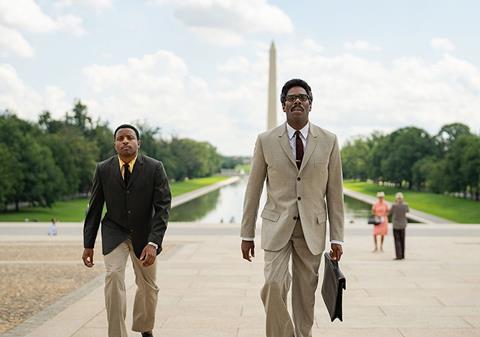Colman Domingo plays the man behind the March on Washington - who found himself sidelined because he was gay

Dir: George C. Wolfe. US. 2023. 97mins
Celebrating the man who helped mastermind the historic 1963 March on Washington — the largest peaceful protest in US history — Rustin introduces audiences to Bayard Rustin, a passionate advocate for racial justice who had to fight to be accepted amongst the Black leadership because he was gay. Colman Domingo is magnetic as the witty, driven leader who fell out with Martin Luther King Jr. because of his sexuality, the two men eventually mending fences to push for change in American policy. Director George C. Wolfe allows the film to slip into biopic conventions, blunting the impact of this inspirational drama, but the film’s heartfelt earnestness mostly overcomes the straightforward approach.
Colman Domingo ensures that Rustin is a layered and vibrant character, pushing the film to be bolder than it otherwise is
After its Telluride and Toronto premieres, Rustin opens in US theatres on November 3 before streaming globally on Netflix from November 17. The film represents a reunion between Wolfe and several of his Ma Rainey’s Black Bottom cast, including Domingo and Glynn Turman, who are joined by Chris Rock and Jeffrey Wright. Produced by Barack and Michelle Obama’s company Higher Ground, this crowd-pleaser could receive awards attention, particularly for Domingo’s fiery turn.
In the early 1960s, Bayard Rustin (Domingo) enjoys a close friendship with Martin Luther King Jr. (Aml Ameen), who values the his opinion on how best to lead the burgeoning civil rights movement. But when word gets out that Rustin is gay — and false rumours spread that he and King are having an affair — he is shunned by the movement, sending him into a kind of exile. Rustin will get another chance to help the cause when he is approached by labour leader A. Philip Randolph (Turman) to help organise the March on Washington for Jobs and Freedom, a massive undertaking with limited resources and not a lot of preparation time, which will bring Rustin and King back together.
Rustin is appealing when it delves into the details of exactly how the rally was orchestrated. Many know the March on Washington for King’s iconic “I Have a Dream” speech, but screenwriters Julian Breece and Dustin Lance Black dramatise the rigorous grassroots planning that went into the event. The challenges weren’t just ones of logistics, though: Rustin explores the bickering factions within the movement, including NAACP head Roy Wilkins (Rock) and Congressman Adam Clayton Powell Jr. (Wright), both of whom who feel Rustin’s flamboyant manner will be targeted by the media if he becomes the face of the March, setting back the cause.
Domingo plays the title role with a mixture of dignity, steeliness and irreverence. His Rustin is unashamed about his sexuality — “What you see, I cannot conceal,” he says plainly — and he has the ability to rally his fellow organisers with the exactness and vigour of a military general. But Domingo also suggests that the man was something of a showboat with a mischievous side, happy to talk back to those in power, especially the disapproving Wilkins. The film can sometimes be dramatically simplistic, relying on perfunctory montages and creaky expositional dialogue, but Domingo ensures that Rustin is a layered and vibrant character, pushing Rustin to be bolder than it otherwise is.
Among the large cast, Rock underwhelms as Wilkins, who doesn’t take kindly to his authority being questioned, but Wright makes his impact felt in a small role, playing Powell with maximum condescension. (As far as Powell is concerned, King and his rabble rousers are small-time compared to the power and prestige he commands as a congressman.) CCH Pounder is also resonant as Anna Arnold Hedgeman, one of the few Black women leaders in the movement, who is dismayed that all the speakers on the March’s will be men. Aml Ameen offers a different take on King than we’ve seen in recent films such as Selma, playing the hallowed figure as life-sized and unsure, stripping away the saintly aura that is usually placed upon him.
Rustin doesn’t diminish King’s importance, but it does argue that history has done the actual architect of the March a disservice. (Rustin, who died in 1987, received a posthumous Medal of Freedom in 2013.) The film notes the irony that Rustin joined with other Black men and women to fight for equality, while being marginalised by that same community because of his sexuality. Wolfe fictionalises two of Rustin’s clandestine lovers — a white aide named Tom (Gus Harper) and a married religious leader, Elias (Johnny Ramey) — to demonstrate that he pursued relationships that, for different reasons, never quite worked out. These subplots add dimension to Rustin but fail to be as riveting as his mission to pull off a peaceful protest that many in the movement fear will be a publicity nightmare.
Production companies: Higher Ground, Bold Choices
Worldwide distribution: Netflix
Producers: Bruce Cohen, Tonia Davis, George C. Wolfe
Screenplay: Julian Breece and Dustin Lance Black, story by Julian Breece
Cinematography: Tobias Schliessler
Production design: Mark Ricker
Editing: Andrew Mondshein
Music: Branford Marsalis
Main cast: Colman Domingo, Chris Rock, Glynn Turman, Aml Ameen, Gus Halper, CCH Pounder, Da’Vine Joy Randolph, Johnny Ramey, Michael Potts, Jeffrey Wright, Audra McDonald
























![The Brightest SunScreen[Courtesy HKIFF]](https://d1nslcd7m2225b.cloudfront.net/Pictures/100x67/3/5/0/1448350_thebrightestsunscreencourtesyhkiff_312678.jpg)
No comments yet